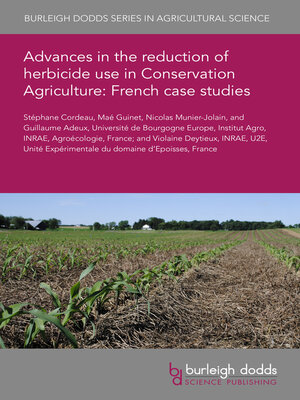Advances in the reduction of herbicide use in Conservation Agriculture
ebook ∣ French case studies · Burleigh Dodds Series in Agricultural Science
By Stéphane Cordeau

Sign up to save your library
With an OverDrive account, you can save your favorite libraries for at-a-glance information about availability. Find out more about OverDrive accounts.
Find this title in Libby, the library reading app by OverDrive.



Search for a digital library with this title
Title found at these libraries:
| Library Name | Distance |
|---|---|
| Loading... |
Conservation agriculture (CA) appears as a promising agricultural pathway to achieve multiperformance but is currently questioned due to its reliance on herbicides for weed management, especially glyphosate. One limit in the development of CA-based agroecological cropping system less reliant on herbicide use is the strict definition of CA based on technical means (i.e. the three principles) rather than targeted objectives. In this chapter, the authors mobilize research carried out on experimental stations (e.g. CA-SYS platform) and farmer networks (e.g. French DEPHY-farm network) to synthesize knowledge on how herbicide-free no-till agriculture could be achieved. They provide insights on the multiperformance of herbicide-free and nature-based CA systems compared to reference CA systems. Designing cover crops to ensure growth in a context of unpredictable weather conditions and facilitate mechanical termination, and ensuring crop establishment in absence of tillage and herbicides represent major research avenues for the development of pesticide-free CA systems.







